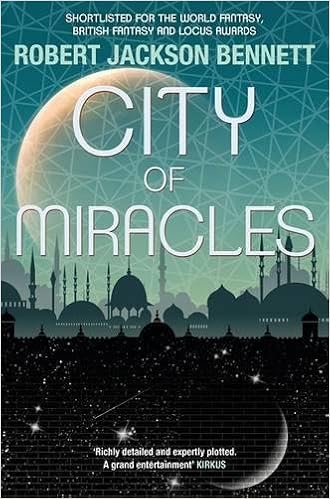The conclusion I draw is not, as you suggested, that miracles fade as their existence goes on, causing fluctuations in their function. Rather, I believe that miracles changed and mutated just as any organism might: the Divine Empire was a teeming ecosystem of miracles and Divine entities, all with varying levels of agency and purpose, all shifting and altering as the years went by.Conclusion of the Divine Cities trilogy (previous volumes were City of Stairs and City of Blades). I wondered, reviewing the latter, if the third book would focus on Sigrud the mysterious
The novel begins with the assassination of a former Prime Minister, by a killer working for a controller he's never met. Only after this does Sigrud reappear: he hasn't seen Shara for thirteen years, and hoped that she would reach out to him again, but now she never will. Vengeance is all that is left to him.
He calls on Mulaghesh, who has a cryptic message from Shara that she recites to him. And that message leads him in search of Tatyana, and thence (with the help of several formidable women) in search of the possibly-Divine being who arranged Shara's death. A being who, it transpires, has every reason to hate and fear the Komayd family.
I still like Sigrud as a character, and City of Miracles adds depth to some of his backstory, explaining why, and how, he has become so good at what he does. I'm happy to report that some good things happen to him in this novel, too. It is, in parts, thoroughly swashbuckling: in other parts, quite horrific. Bennett writes about the dismal underside of battle, the orphaned children and the refugees; the ways in which they forget, and then remember, what has happened to them, and why. It's the weaponisation of grief and pain, and it is horribly effective.
The children are important: Shara knew that, and was working with wealthy friends to provide for them. Sigrud is still mourning his own daughter (the dead one: strangely, he doesn't seem that interested in the surviving one or her offspring) and marvelling at the ways the world has changed -- with remarkable rapidity -- while he wasn't paying attention. It is worth noting, as several of the people he meets remark, that he hasn't aged a day since they first met him.
I didn't find this as satisfactory a read as City of Stairs. The events are momentous, the staging epic: but Sigrud's blend of bloodthirsty competence and quiet despair has a flattening effect. There is a rushed, unedited feel to some of the writing: 'neither of them' when there are three people in a situation; 'such weapons should not be trusted with governments'; 'a small, tiny mirror' ... It is, though, a nicely-rounded conclusion to the trilogy, with plenty of closure and simultaneously a sense of new beginnings.

No comments:
Post a Comment